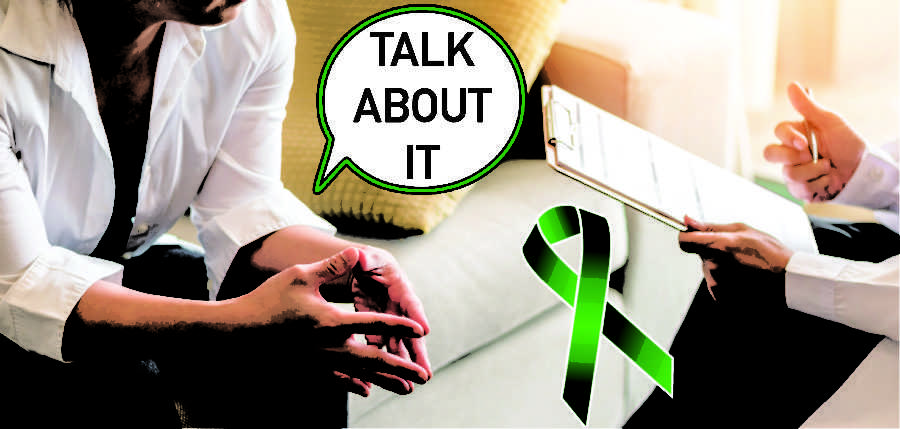Talk About It: Common mental health issues
The Anxiety and Depression Association of America reports that the most common mental health disorders are anxiety disorders.
October 24, 2019
Editor’s note: This is part four in our weekly mental health series “Talk About It.” Sensitive content may follow.
When it comes to mental health, self-care can be difficult with the wide range of mental health issues that exist.
Wen-Hsin Chang, staff psychologist and interim assistant director for Student Counseling Services, and Kristen Sievert, staff psychologist and grief and suicide prevention coordinator for Student Counseling Services, said anxiety, depression, relationship issues and academic performance concerns are the top four mental health issues that Student Counseling Services sees.
“Often with mental health, it is on a continuum,” Sievert said. “For some people, it might just be occasional or mild concerns that don’t have a significant impact on their functioning, and then sometimes we see it can be a more severe, more significant impact for them. Even within anxiety and depression, it is really of range.”
Anxiety disorders are the most common mental health issue in the United States, affecting 40 million adults age 18 and older, or 18.1 percent of the population every year, according to the Anxiety and Depression Association of America (ADAA) website.
Anxiety disorders are highly treatable, yet only 36.9 percent of those suffering receive treatment.
According to the ADAA website, it is not uncommon for someone with an anxiety disorder to also suffer from depression or vice versa. Nearly one-half of those diagnosed with depression are also diagnosed with an anxiety disorder.
The most commonly diagnosed form of depression is major depressive disorder. In 2015, around 16.1 million adults aged 18 years or older in the United States had experienced at least one major depressive episode in the last year, which represented 6.7 percent of all American adults. Depression is the leading cause of disability in the United States among people ages 15 to 44, according to the ADAA website.
Chang and Sievert said there are many different warning signs to look out for within either oneself or within peers and family.
“There are a lot of little things that you might notice when people are struggling,” Chang said. “It will impact their eating behavior, their sleeping patterns — like not sleeping well — and some of them might start to isolate themselves from their peers. Some people you can see that they get irritated easily or are feeling sad or crying more often.”
Other examples of warning signs, Sievert said, include people becoming more anxious or on edge, as well as increasing substance use as a way to cope.
When someone starts to notice these signs within themselves, Chang said it can help if they reach out to either Student Counseling Services or trusted family or friends.
“There is a stigma of ‘we should be okay,’ and it can make it difficult for people to disclose and suffer longer,” Chang said.
When noticing these signs within friends or close peers, Sievert recommended finding time to have a conversation with them. She said to approach the matter empathically and provide concrete examples of the signs the person is showing.
“If you are sitting with someone who is highly distressed and you don’t know what to do, during office hours you can call us to consult about what to do,” Chang said.
The Student Counseling Services phone number is 515-294-5056.
For the large variety of mental health issues, Student Counseling Services also offers many different types of support for those who need it.
“We have Stepped Care Model, which is really a range of services that we provide that we match with a student who is showing concerns and what they are needing to this model to see what type of support might be most helpful for them,” Sievert said.
The steps in the Stepped Care Model include self-help, community-based prevention, face-to-face brief support, group-based services, brief individual services and specialty services and referral.
One of the main prevention services Student Counseling Services offers is Campus Connect Training.
“[Campus Connect trainings] are in person trainings primarily targeted for students to be able to know how to support someone that they are concerned about know about resources available,” Sievert said.
Campus Connect Training is a gatekeeper training program for students that is designed to increase the participant’s knowledge, awareness and skills concerning college student suicide.
According to the Student Counseling Services website, Campus Connect Training aims to increase a participant’s knowledge about suicide statistics, risk and protective factors, warning signs and referral resources.
The website said the training also aims to increase empathic listening skills, communication skills and the ability to ask individuals if they are thinking about suicide and to increase self awareness concerning the potential emotional reactions gatekeepers may experience when interacting with students in crisis.
The next Campus Connect Training will take place Nov. 7 and Nov. 8 for two sessions, 9 a.m. to 12:30 p.m. and 1 to 4:30 p.m. To register, go to the Student Health and Wellness website.
Student Counseling Services can be found on the third floor of the Student Services Building located at 2505 Union Drive. The hours for walk-ins are currently 8 a.m. to 3 p.m. Monday through Thursday. Counselors are available 8 a.m. to 5 p.m, Monday through Friday, for students who feel they are in crisis.







